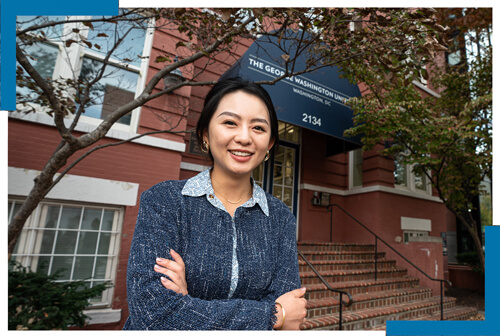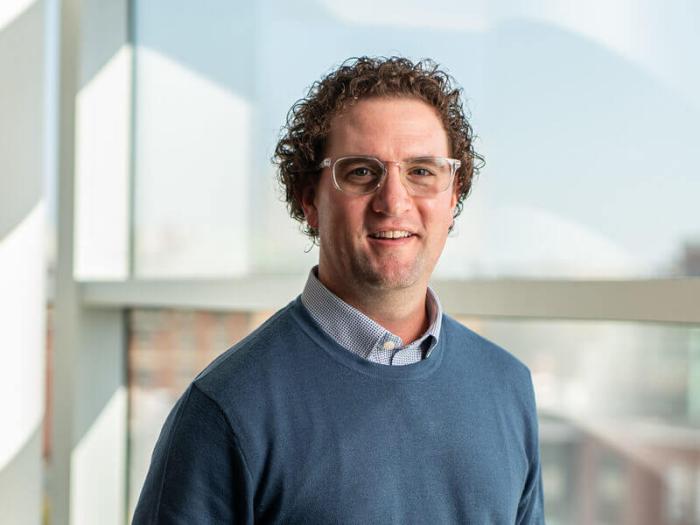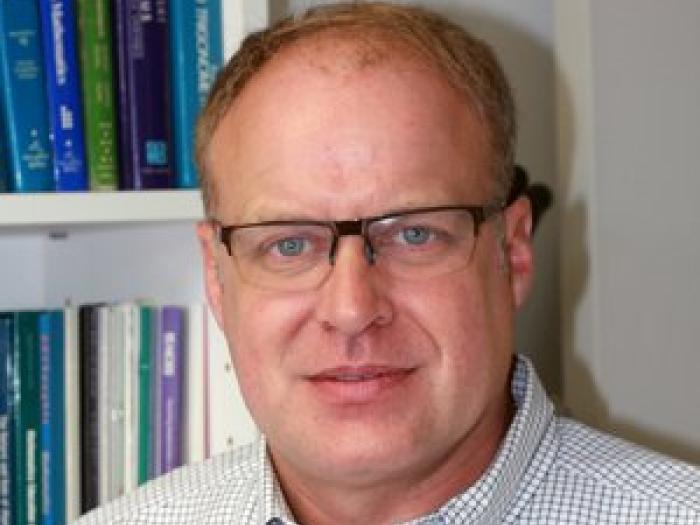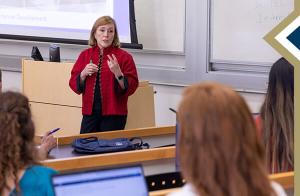Ph.D. in Education - Curriculum and Instruction Concentration
Advance the Future of Education
The central issues addressed in curriculum and instruction (C&I) inquiries are inherently cross-disciplinary, requiring researchers to explore boundaries of disciplines to discover enduring findings. Our doctoral concentration prepares C&I researchers to employ a range of theory and cutting-edge research methods. Participants will develop theories, models, explanations, and curriculum with significant impact toward academic, social, cultural, environmental, and civic advancement.
Program participants study problems that involve:
- Modeling complex interactions involving the unique characteristics of learners, teachers, and the affordances of educational materials and tasks.
- Describing the experiences of diverse learners within collaborative and individual spaces and settings.
- Developing understandings of the content, organization, and purpose of curriculum in schools and community-based educational contexts.
Personalized Mentorship
You will be paired with one of our leading faculty mentors with experience in cross disciplinary studies and your selected area of curriculum and instruction to guide you in your research development.
Research Focused
You’ll bring your experience in education to the design, development, data collection, and analyses in a research project.
Collaborative
Engage with peers from multiple concentrations within our inclusive cross-disciplinary team, as well as within more focused research projects.
The GW Advantage
As a Carnegie R1 institution (very high research activity), the George Washington University is home to world-class faculty that are leading cutting-edge research, along with diverse labs, cross-collaborative initiatives between schools and local organizations, and unparalleled educational and employment opportunities.
Degree:
Doctor of Philosophy (PhD) in Education, Curriculum and Instruction Concentration
Course Delivery:
Foggy Bottom Campus
Program Entry:
Fall
- Our Mission
The aims of the PhD are to:
- Use multiple modes of scholarly inquiry to conduct rigorous research and develop new theory related to problems that require the integration of multiple disciplines and fields of study, in which education and/or human development play a major role.
- Build theoretical and conceptual foundations of key fields of study within the larger domain of education and human development.
- Contribute to the improvement of policy and practice.
- Promote research in partnership with other organizations (e.g., think tanks, research institutes, both in the U.S. and abroad).
- Create a highly valued educational experience at GSEHD through innovation, increased collaboration, and research.
- Curriculum Requirements
The following requirements must be fulfilled: 60 credits, including 36 credits in core courses, and 24 credits in the concentration, successful completion of a research project, successful completion of the comprehensive examination; oral defense of both the dissertation proposal and the dissertation.
Code Title Required Core Courses: SEHD 8200 Foundations of Education I SEHD 8201 Foundations of Education II SEHD 8210 Doctor of Philosophy Seminar in Education Research I SEHD 8211 Doctor of Philosophy Seminar in Education Research II Research Methods: 12 credits of doctoral-level research methods coursework, selected in consultation with advisor. At least one course must be in quantitative research methods and one in qualitative research methods. Dissertation: SEHD 8999 Dissertation Research (taken for at least 12 credits) Additional Requirements: Successful completion of a research project. Successful completion of the comprehensive examination. Oral defense of both the dissertation proposal and the dissertation. Code Title Curriculum and Instruction Concentration Requirements: 24 credits in graduate-level courses determined in consultation with the advisor. Course selections are determined by the focus of the concentration and the specific interests of the student.
Research Areas Seeking Applicants
We are currently accepting applications to the Ph.D. in Education, Curriculum and Instruction Concentration to work on the following projects. In the application select “Education” as field of study, then select the Curriculum & Instruction concentration.
- Science teacher reflective practice and use of student performance data to enhance three-dimensional science learning
This project builds on the curriculum development work of a current NSF funded project, Integrating Chemistry and Earth (ICE). The multi-disciplinary team of researchers, school district administrators, and teachers is preparing for expanded work to explore and model the impacts of teacher reflection and analysis of student performance data on teachers’ conceptions and practice of three-dimensional teaching and students’ three-dimensional science learning. Involvement in this work entails working directly with Dr. Jonathan Grooms in collaboration with scholars from across multiple institutions with a wealth of research experience in diverse science classrooms from across the country.
To learn more, contact Dr. Grooms at jgrooms
 gwu [dot] edu (jgrooms[at]gwu[dot]edu).
gwu [dot] edu (jgrooms[at]gwu[dot]edu). - Developing spatial competence to support learning in STEM
This project, led by Dr. Curtis Pyke, focuses on developing an explanatory cognitive model of spatial competence to address the need for improvements in spatial skill development in k-16 STEM education. Questions addressed include:
- What is the foundation of spatial competence?
- What level of spatial competence is required for success in STEM fields?
- What are the experiences needed to develop spatial competence?
- What is the role of spatial competence in innovation?
- How does spatial competence develop in interaction with virtual phenomena?
This work may be conducted in collaboration with GW faculty in the social cognition lab as well as with psychology, human development, and STEM faculty.
For additional information, contact Dr. Pyke at cpyke
 gwu [dot] edu (cpyke[at]gwu[dot]edu).
gwu [dot] edu (cpyke[at]gwu[dot]edu).- Using curriculum and instruction to translate scientific research findings and practices from the laboratory into learning experiences that impact students’ understanding of science
This project focuses on urban high school students’ development of biomedical and socio-scientific knowledge as their curriculum and instruction is infused with new and emerging knowledge from biomedical research laboratories. This research is a collaborative effort between C&I PhD faculty (Dr. Jonathan Grooms & Dr. Curtis Pyke), faculty from GW’s School of Medicine and Health Science, researchers from Children’s National Center for Translational Research, and local DC area teachers. Of particular interest is the impact of translational C&I on high school students’ cognition about the nature of science and the scientific knowledge being created in their community.
For additional information, contact Dr. Pyke at cpyke
 gwu [dot] edu (cpyke[at]gwu[dot]edu) or Dr. Grooms at jgrooms
gwu [dot] edu (cpyke[at]gwu[dot]edu) or Dr. Grooms at jgrooms gwu [dot] edu (jgrooms[at]gwu[dot]edu).
gwu [dot] edu (jgrooms[at]gwu[dot]edu). - Interdisciplinary literacy and informal learning
Explore how people learn beyond the traditional classroom. Our doctoral program invites applicants with a passion for interdisciplinary inquiry into informal learning environments, such as museums, libraries, and cultural centers. We encourage candidates to investigate the evolving landscape of literacy education, bridging both formal and informal settings to understand how diverse communities engage with knowledge. If you are ready to conduct rigorous research that pushes the boundaries of educational theory and practice, we welcome you to apply.
To learn more, contact Dr. Jonathan Eakle at jeakle
 gwu [dot] edu (jeakle[at]gwu[dot]edu).
gwu [dot] edu (jeakle[at]gwu[dot]edu).
Apply Now
GSEHD’s Office of Admissions invites you to apply for a spot in our program. Please review the following admission and financial information.
Ready to take the next step in your career? Review our step-by-step guide to applying to GSEHD >
To learn more about the program, admission process, and upcoming events, please connect with the GSEHD Admissions Team at docinfo![]() gwu [dot] edu (docinfo[at]gwu[dot]edu) or 202-994-9283.
gwu [dot] edu (docinfo[at]gwu[dot]edu) or 202-994-9283.
| Apply Now | Schedule Meeting with Admissions Coach |
To be considered for admission, applicants must submit the online application form as well as the following required supporting documents. There is no application fee.
- Prerequisite: Master's Degree in Education, Curriculum and Instruction, or a related field
- Curriculum Vitae
- Statement of Purpose: An essay of 1200 words or less, through which the candidate clearly identifies the purpose in undertaking study and research in the PhD program. The essay should include: (a) a rationale for choosing the Curriculum and Instruction Concentration, (b) articulation of personal research interests and how those align with those of the faculty and/or projects of the C&I Concentration, (c) how the applicant’s background and related qualifications prepare them for Ph.D work, and (d) how the cross-disciplinary PhD program aligns with the candidates long term goals.
- 3 Letters of Recommendation (academic and/or professional, with one preferred from a professor in the applicant’s Master’s degree program)
- Transcripts from all previously attended colleges or universities
- Interview with Faculty: Applicants should be prepared to discuss the alignment of their research interests with those of the program faculty.
- Writing Sample (Optional): Candidates are encouraged to submit a current writing sample. The sample should reflect the candidate’s abilities to articulate complex ideas and to utilize evidence in support of an argument. The writing sample should also provide evidence of the candidate’s research skills and engagement with scholarship.
Please note: The GRE is not required.
*Additional application requirements may exist for international applicants.
The deadline for Fall 2026 admissions has passed. For more information or to inquire about the next admissions cycle, contact the GSEHD Admissions Team at docinfo
 gwu [dot] edu (docinfo[at]gwu[dot]edu) or 202-994-9283.
gwu [dot] edu (docinfo[at]gwu[dot]edu) or 202-994-9283.Application Timeline Fall Priority Deadline Nov 1 Round 1 Deadline Dec 1 Round 2 Deadline Jan 15
Tuition & Financial Aid
We know embarking upon graduate school is a big decision - due in part to the costs of attending. At GW, we understand the time and thought behind making graduate school work for you. Please take a moment to learn more about the options and opportunities available to help fund your graduate education.
Graduate tuition is charged per credit hour, unless otherwise noted. Rates vary by program and location.
The tuition rate* for the PhD in Education - Curriculum and Instruction Concentration program is $1,960 per credit hour.
This program requires 60 credits.
Please note: Additional fees may apply for international students, late fees, etc. Current tuition rates may be updated during the year.
*Summer 2025, Fall 2025 and Spring 2026
Scholarships are available to eligible admitted students. Review eligibility requirements and learn more about funding your education >
Coming from an international background, the C&I PhD program at GSEHD has truly become my home. The inclusive and welcoming community of faculty, peers, and staff has created an environment where I feel valued and supported, like part of a family. Everyone here is dedicated to growing together, both personally and professionally. The program’s rigorous and thoughtfully designed courses, combined with the incredible resources offered by GW and Washington, D.C., have provided me with unparalleled opportunities for learning, collaboration, and self-discovery. This experience has not only enriched my academic journey but has also fostered a sense of belonging that I will cherish forever.
- Zhongxin Zheng

Coming from an international background, the C&I PhD program at GSEHD has truly become my home. The inclusive and welcoming community of faculty, peers, and staff has created an environment where I feel valued and supported, like part of a family. Everyone here is dedicated to growing together, both personally and professionally. The program’s rigorous and thoughtfully designed courses, combined with the incredible resources offered by GW and Washington, D.C., have provided me with unparalleled opportunities for learning, collaboration, and self-discovery. This experience has not only enriched my academic journey but has also fostered a sense of belonging that I will cherish forever.
- Zhongxin Zheng
Career Outlook
Graduates of the Ph.D. in Education, Curriculum and Instruction Concentration will be prepared to conduct and disseminate research, pursue faculty roles, and lead innovation in education contexts.
- Curriculum & Instruction Career Opportunities
-
- Direct research portfolios of professional organizations
- Engage in teaching and research at colleges and universities
- Lead education centers
- Design and conduct research studies for think tanks, government agencies, and other stakeholders
- Develop and implement curriculum
- Facilitate professional learning opportunities
- Potential Employment Settings
-
- Colleges and Universities
- Government Agencies
- School Systems
- Think Tanks
- Research Institutions
- Education Foundations
- Informal Learning Centers
- Museums



Associate Professor, Curriculum and Pedagogy; Co-Director, GWTeach






